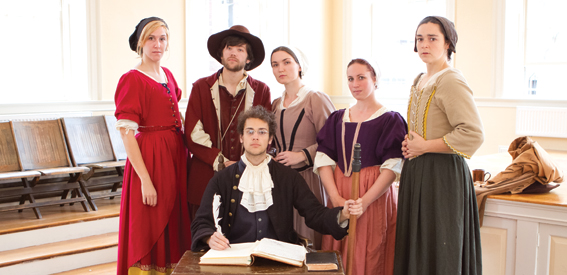STILLPOINT Archive: last updated 12/06/2013
Since it debuted in 1992, Cry Innocent: The People vs. Bridget Bishop has taken thousands of Salem visitors on an interactive journey through the minds and morals of the Witch Trials of 1692. Soon the show, produced by History Alive! at Gordon and written by Associate Professor of English Mark Stevick ’87 (based on an early version of the story by David Goss ’74), will reach communities across the country through a new film. After the play’s cast and crew wrapped its twenty-first season this spring, Stevick and his wife, Kristina Wacome-Stevick ’98, History Alive!’s artistic director, began work with local filmmaker Paul Van Ness ’73 to bring the production to life on screen. Shot at Salem’s Pioneer Village with a cast of 52—including more than 30 Cry Innocent veterans and 8 of the 9 original players—the film aims to capture all the intrigue and suspicion of the staged performance, and will be offered in interactive and standard versions. Meanwhile, two of Stevick’s other plays have seen reprises as well: The Screwtape Letters, an adaptation of the C. S. Lewis classic; and Goodnight, Captain White, a murder mystery dinner theater piece based on an oft-hidden dark blotch in Salem’s history.
The Screwtape Letters, written by Stevick in 1990 and directed by Norm Jones in Gordon’s Margaret Jensen Theatre this October, celebrates Lewis’s life and works through an 80-minute cosmic—and often comic—tour of the battlefields where thestruggle for souls is waged. Its production at Gordon this year marked the 50th anniversary of his death.
For Goodnight, Captain White, which was first staged in the mid-’90s, Stevick took a different approach to dramatizing a historical tale. The Cry Innocent script is stringently accurate, but Goodnight, Captain White takes poetic license with the details of the 1830 murder of a Salem sea captain. “In this case I was guided more by what I think will please an audience, what I want to explore as a playwright, and what I can mine from history, rather than an obligation to historical accuracy,” Stevick says. The result: daringly playful, intricate farce informed by soberingly real history.
http://www.gordon.edu/theatre